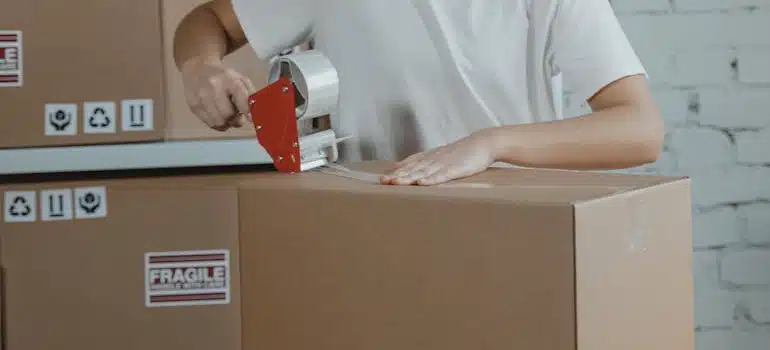Do you need a climate-controlled storage unit?
Miami’s year-round sunshine might be perfect for beach days, but it’s not so friendly to everything you put into storage. While standard storage units may suffice in drier, cooler regions, Miami’s heat and humidity demand extra protection for your belongings. If you’re planning to store anything valuable, delicate, or long-term, climate control combined with Miami moving and storage is a smart safeguard. When it comes to preserving what matters most, you need a climate-controlled storage unit to stand up to South Florida’s extreme conditions. So the real question isn’t whether climate-controlled storage is worth it—it’s whether you can afford not to have it.
Why Miami storage units face unique challenges
Let’s talk numbers. Miami’s average annual humidity hovers around 75%, with summer spikes into the 90s. Combine that with temperatures that regularly soar above 90°F, and you’ve got the perfect recipe for mold, mildew, and heat damage.
Standard storage units offer basic shelter, but they’re not sealed against the elements. Air inside a non-climate-controlled unit can feel like a sauna in summer. Moisture seeps in. Temperature fluctuates wildly. Over time, these conditions slowly degrade anything not designed to endure them.
Being in a subtropical climate, climate-controlled storage units in Miami help stabilize internal conditions. That means regulated humidity, consistent temperatures, and peace of mind.

What exactly is climate-controlled storage
It’s important to distinguish between temperature controlled vs climate controlled storage in Florida. While the terms are often used interchangeably, they aren’t the same. Temperature-controlled storage keeps your unit within a set temperature range—usually between 55°F and 85°F—but doesn’t necessarily regulate humidity.
On the other hand, climate-controlled storage manages both temperature and humidity, offering full environmental protection. In FL, this distinction matters. Miami storage humidity is just as destructive as heat, maybe even more so.
What items need climate control
Many common belongings need a climate-controlled storage unit. If you’re storing for several months or more, or keeping your moving boxes in Miami during the peak of wet season (June through September), consider climate control for:
- Electronics – TVs, gaming consoles, computers, and audio equipment are sensitive to both heat and moisture. Protect electronics in storage, as humidity can cause internal corrosion and condensation damage.
- Leather goods – Leather absorbs moisture, leading to discoloration, mold, and a permanent musty smell. Bags, shoes, and furniture are especially vulnerable.
- Photos and important documents – Paper products curl, yellow, and become brittle in humid environments. Photographs can stick together or grow mold.
- Artwork – Paintings, prints, and sculptures are all highly sensitive to changes in temperature and moisture. Mold and color fading are common risks.
- Clothing – Delicate fabrics and seasonal wardrobes can attract mold or mildew if stored without proper air circulation and humidity control.
- Musical instruments – Wood, strings, and metal components all react poorly to moisture. Instruments can become unplayable if stored improperly.
- Wooden furniture – Wood expands and contracts with temperature shifts, which can lead to cracks, warping, or loose joints. High humidity negatively affects furniture, too, as it promotes mold and rot.
- Appliances – Refrigerators, washers, and dryers contain electronic components and rubber seals that deteriorate in humid conditions.
When in doubt, ask yourself: Would this item be safe if left in a hot garage all summer? If the answer is no, it needs climate control.

Who needs climate-controlled storage in South Florida
While some storage needs can get by without climate control, many situations in Miami make it an essential choice. To determine if it’s right for you, consider:
- What you’re storing
- How long it will stay in storage
- How much sentimental or financial value it holds.
If you’re storing household goods during a summer move to Miami, running out of space at home, or safeguarding items while renovating, climate control becomes a smart option for anything that could suffer from humidity or heat. That includes seasonal wardrobes, collectibles, family photo albums, and anything made of wood, leather, or paper.
Business owners storing documents, inventory, or electronics should consider it essential. For students leaving laptops and appliances behind over break or retirees storing valuables while downsizing, climate control offers much-needed protection. And if you’re not sure how long your items will be in storage? Go with climate control—it keeps your options open and your items safe.
How to decide if climate control is worth it for you
Cost often drives the decision, but it’s worth weighing the risk of damage against the small monthly increase in price. If replacing even one or two stored items would cost more than the monthly fee for climate control, you’ve already justified the upgrade.
Also think about convenience. Climate-controlled units are usually located indoors or in more modern facilities, offering better security, cleaner environments, and a more comfortable loading experience, especially during Miami’s summer heat or sudden rainstorms. Ultimately, climate control is the smart move if you’re storing anything you care about.

FAQ: Climate-Controlled Storage in Miami
Still sweating over whether you need a climate-controlled storage unit? We’ve got the answers to your hottest questions right here.
Is climate-controlled storage more expensive?
Yes, typically—but the cost difference is often small compared to the potential loss or damage of your items. Think of it as preventive care for your belongings.
How do I know if a unit is truly climate-controlled?
Ask for specifics. A true climate-controlled unit regulates both temperature and humidity. Reputable storage facilities will clearly advertise and explain what their units offer.
Do I need climate control if I’m only storing for a month?
If it’s during the wet or hot season or if you’re storing electronics or sensitive items, even a few weeks can make a difference.
Can I use a dehumidifier in a regular storage unit instead?
In most facilities, no. Plug-in devices are usually not allowed due to safety rules. Climate control through the facility is the better (and safer) option.
What’s the best time of year to rent climate-controlled storage in Miami?
Demand increases in summer and hurricane season, so it’s wise to reserve early if you need a climate-controlled storage unit between June and October.
